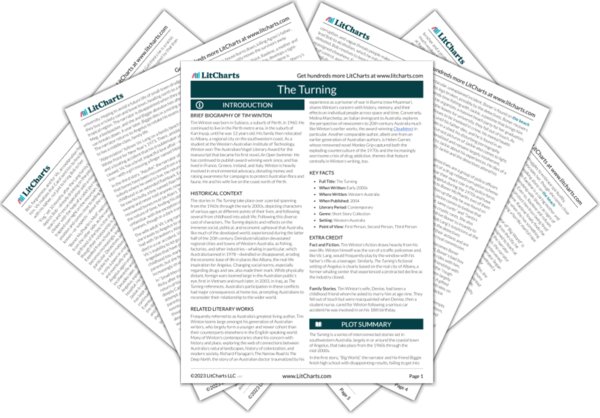Trauma and Memory
The dynamic between trauma and memory is central to the events of The Turning, as the characters live or relive the momentous, difficult, and violent experiences that shape their lives. The book examines the full effects of trauma, as people first experience it and then later remember and process it, through its reoccurring characters, Vic and the Lang family in particular. The novel develops the story of Vic’s childhood out of chronological order, inviting…
read analysis of Trauma and MemoryFamily, Violence, and Love
Many of the stories in The Turning feature or are connected by families. Winton depicts not only a great variety of family structures and habits, but a wide spectrum of healthy and toxic relationships within these families. Frequently, the more broken families are shaped by violence, whether domestic or outside the home. In focusing on the tension between familial love and familial violence, Winton shows how the family, as a basic unit of society, is…
read analysis of Family, Violence, and LoveAddiction
Addiction looms large in The Turning, as characters struggle with it themselves or struggle to support their family, friends, and partners through it. The reasons characters develop addictions are varied, though often stemming from personal trauma. Through the book’s portraits of addiction and its effects, Winton argues that addiction is always complex, and it requires patience, understanding, and support to be overcome. All the same, not everyone is able to provide that support, for…
read analysis of Addiction
Belonging and Escape
Throughout The Turning, characters feel torn between their hometowns and the world beyond them. Ambivalent at best and frequently hostile, the sense of belonging they feel (or lack thereof) with their hometowns—is rooted in their personal histories and with the histories of their families and communities. Much of this stems from the socio-economic situations of towns like Angelus and White Point, which are in clear decline and, later, experiencing gentrification and population displacement. Even…
read analysis of Belonging and EscapeRegret and Forgiveness
As the characters of The Turning look back at their lives, many of them feel regret, shame, and disappointment in their actions or the actions of those around them. Some characters are consumed by the past, thinking about and reliving it all the time. Others have repressed their memories so effectively that it takes a major disruption to their routine to reveal the trauma that has been haunting them. In all of these situations, however…
read analysis of Regret and Forgiveness






